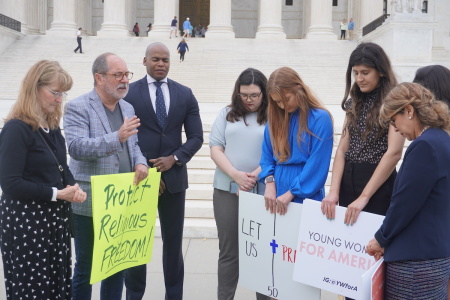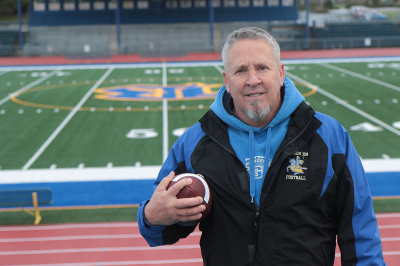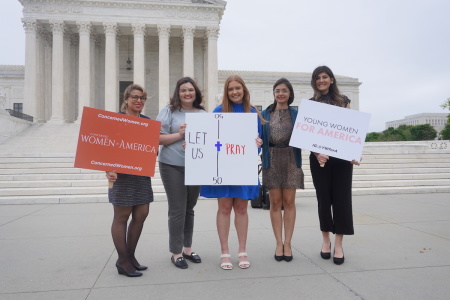Supreme Court debates if football coach's on-field prayer is religious exercise or 'coercion'

A high school football coach fired for praying on the field after games had his case argued before the U.S. Supreme Court on Monday, with justices debating whether his religious practices were coercive or constitutionally protected.
The Supreme Court heard oral arguments in the case of Kennedy v. Bremerton School District, with coach Joe Kennedy being represented by former U.S. Solicitor General Paul Clement.

In 2015, Kennedy, an assistant coach at Bremerton High School in Washington state, was punished and eventually fired by the Bremerton School District for praying on the 50-yard line after games.
In his opening argument, Clement said that the coach’s prayers were “doubly protected by the Free Exercise and Free Speech Clauses” of the First Amendment of the Constitution.
“When the school district fired him for that fleeting religious exercise out of endorsement concerns, it not only violated the First Amendment, but it ignored a veritable wall of this court’s precedents that make it clear that a school does not endorse private religious speech just because it fails to censor it,” said Clement, who served as the U.S. solicitor general and later acting attorney general during the George W. Bush administration.
Justice Sonia Sotomayor pressed Clement about when a school official’s religious practices can be considered private and when they are considered public, such as if a teacher is reading the Bible aloud before class begins.
Clement answered that if a teacher read her Bible “before the bell” or “after the bell” and did so “either silently or barely audibly,” that would be protected as “private speech.”
Sotomayor argued that a teacher is “on duty” while remaining “in the classroom” and their actions could be curtailed by their employer. Sotomayor brought in the example of Kennedy, asking why he should not be considered “on duty” while remaining on the football field after games.
“The school has a fair amount of flexibility to determine what the duties of the coach are,” replied Clement. “Here, they did not say that his duties were an all-encompassing supervisory role.”
“It’s in the record, and I think undisputed, that the coach could do other things, other private things of a comparable amount of time because this is a fleeting religious exercise.”
Justice Elena Kagan expressed concern with Kennedy’s prayers putting “a kind of undue pressure, a kind of coercion on students to participate in religious activities when they may not wish to.”
Clement countered that the school district did not cite “coercion concerns” when they punished Kennedy years ago but instead expressed concern over “endorsement” issues.
Justice Neil Gorsuch referenced the 2000 case of Santa Fe Independent School District v. Doe. The high court ruled that a Texas town’s practice of having students holding prayers over a loudspeaker before high school football games was unconstitutional.
Clement said Kennedy’s practice was “radically different” from the situation in the Santa Fe case, noting that the loudspeaker and the process of determining who gave prayers involved a more blatant example of government speech.
Clement compared Kennedy’s actions to professional athletes who cross themselves before a play or kneel with thanks to God after scoring a touchdown, noting that these were recognized as individual actions.
Richard B. Katskee, legal director at Americans United for Separation of Church and State, presented oral arguments on behalf of the school district.
“No one doubts that public school employees can have quiet prayers by themselves at work, even if students can see,” said Katskee. “If that were the issue, there wouldn’t be a case here because the district allowed that. But that wasn’t good enough for Mr. Kennedy. He insisted on audible prayers at the 50-yard line with students.”
Katskee said that “some of these kids were just 14 years old."
"Mr. Kennedy’s actions pressured them to pray and also divided the coaching staff, sparked vitriol against school officials, and led to the field being stormed and students getting knocked down.”
Justice Clarence Thomas asked Katskee whether a high school football coach taking a knee during the national anthem to protest racism was also an unacceptable form of government speech.
Katskee answered that if, for example, “the coach goes to the center of the field in front of everyone during the national anthem,” then it is “absolutely” constitutes “government speech.”
Thomas asked for a clarification on how it was government speech, with Katskee responding that it was a “public act and public statement” and could not be considered a private action.
Justice Brett Kavanaugh asked Katskee if a coach was allowed to do the sign of the cross before a game, to which Katskee replied that “if the coach is doing it while not making himself the center of attention at the center of the field, it's perfectly fine.”
“I don't know how we could write an opinion that would draw a line based on not making yourself the center of attention as the head coach of a game,” Kavanaugh countered.

In 2015, Bremerton officials suspended and then fired Kennedy for his practice of praying on the football field after games, with the coach suing the school district in 2016.
A three-judge panel of the U.S. 9th Circuit Court of Appeals ruled against Kennedy in 2017, with the Supreme Court initially refusing to intervene in 2019.
In 2020, Judge Ronald Leighton ruled in favor of the school district, concluding that it had a right to restrict religious expression to prevent government endorsement of religion.
In March 2021, a 9th Circuit panel again ruled against Kennedy, with Judge Milan D. Smith Jr. authoring the unanimous court opinion in favor of Bremerton.
“BSD’s efforts to prevent the conduct did not violate Kennedy’s constitutional rights, nor his rights under Title VII,” wrote Smith.
“In sum, there is no doubt that an objective observer, familiar with the history of Kennedy’s practice, would view his demonstrations as BSD’s endorsement of a particular faith. For that reason, BSD had adequate justification for its treatment of Kennedy.”
Kennedy again appealed to the Supreme Court, which announced in January that it would hear arguments in the case.






















